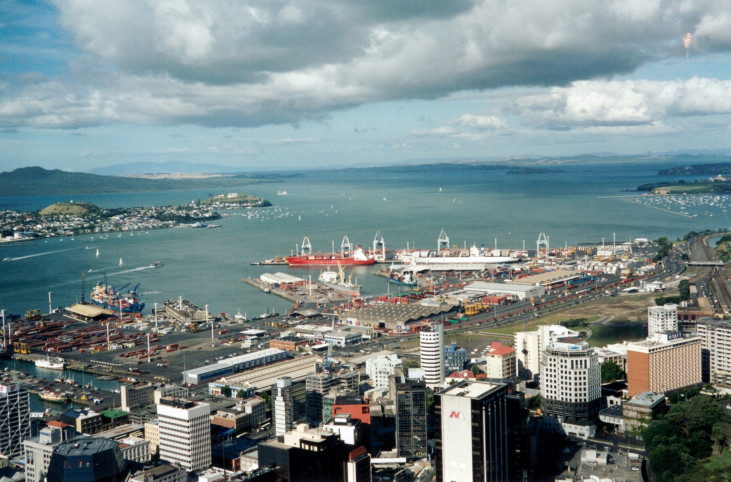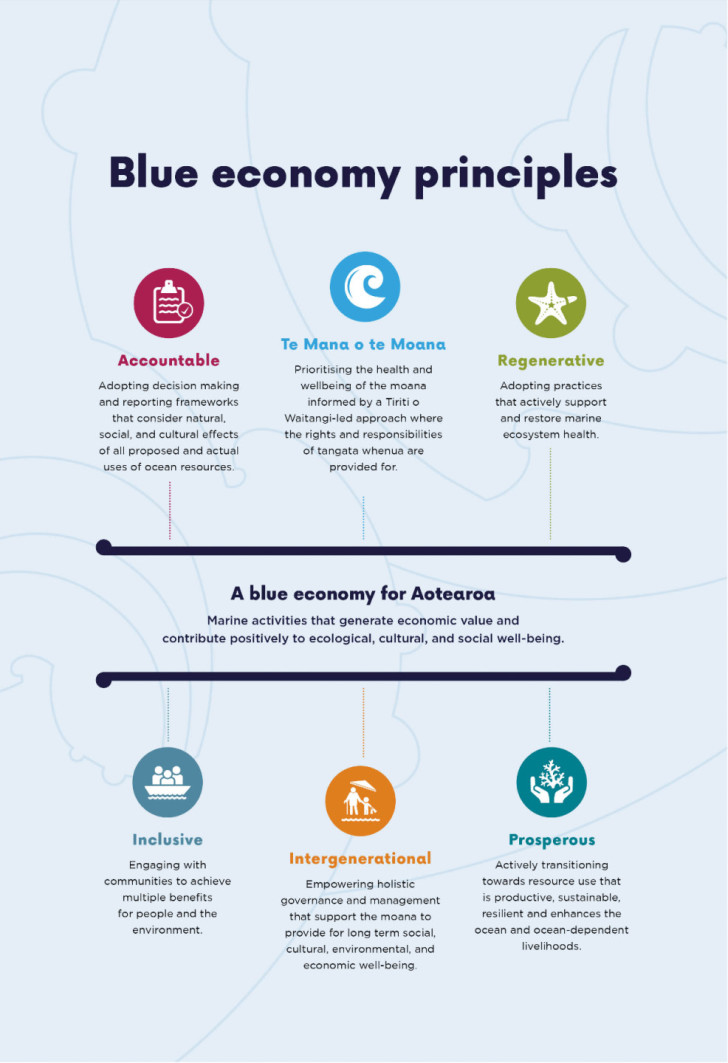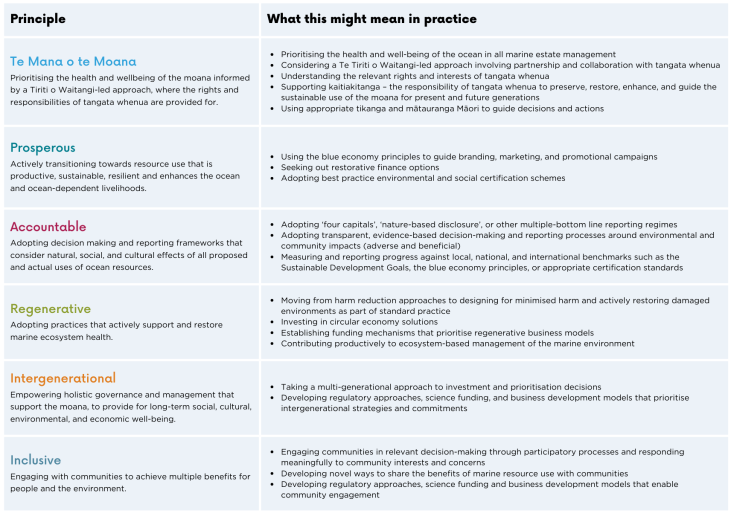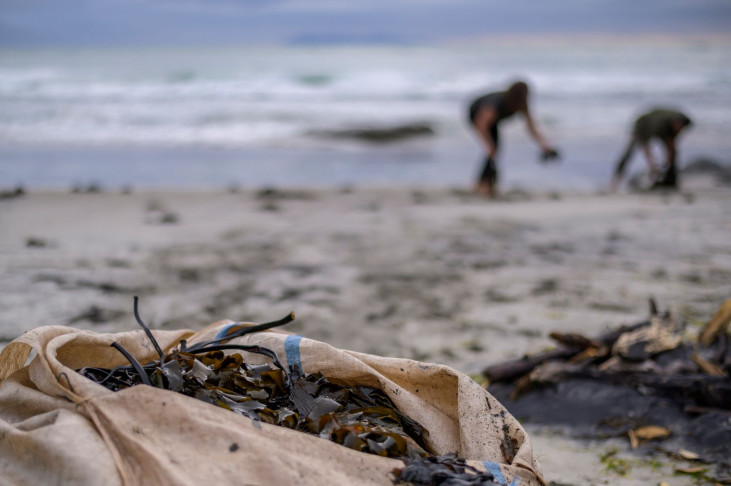Posted on 26 September 2023
Seafood Magazine: Oceans are our economic and social backbone
- 7 Minutes to read
Shared with permission from Seafood New Zealand Magazine - August 2023
The United Nations, WWF, and the World Bank Group have called it, and nations are limbering up. Internationally, countries are racing to add a ‘blue economy’ to the top of their agendas for developing sustainable business.
Global agencies and nations agree that oceans are a fundamental part of solving the planet’s food, energy, and climate challenges, and oceans represent vast economic opportunities if we take a genuinely sustainable approach.
Aotearoa New Zealand has an immediate opportunity to maximise its unique position, knowledge, and potential in the world. It’s time to transition to a sustainable blue economy that can revitalise oceans and create health and wealth for people and the planet.
The Sustainable Seas National Science Challenge has brought together almost a decade of research, including international examples, to guide a blue economy pathway unique to Aotearoa New Zealand.
The Challenge sees a sustainable blue economy as an opportunity to move from an ‘extract for least harm’ to a ‘restore to generate wealth and wellbeing’ approach. Marine ecosystems are more resilient and productive when they’re healthy.
The Challenge defines the blue economy through an Aotearoa New Zealand lens, which places people and the moana at its heart.
Marine activities that generate economic value and contribute positively to ecological, cultural, and social well-being.
A set of principles to support the transition to a blue economy
The Challenge has developed a set of principles that centre Te Ao Māori, Te Tiriti o Waitangi, and ecosystem-based management to help transition to a blue economy. The principles are designed to help decision-makers, iwi and hapū, and people working in the finance and marine sectors to make good decisions about marine management, business strategy and operations, finance, and reporting.
Tony Craig, Partner in Terra Moana Ltd, says, “The principles provide an overarching framework so people can understand what’s expected when looking to involve themselves in or with the blue economy.”
“We’re pleased to be part of such a determined and constructive team in Sustainable Seas. We all worked hard to ensure the wording of the principles requires people to think about how to achieve the necessary critical balance. For example, you can’t consider only single perspectives. You must show how you consider Te Tiriti, economic, social, cultural, and economic wellbeing factors.”

Photo credit: Andry Roby, Unsplash
A principle-based blue economy for Aotearoa New Zealand encourages activities that:
- arise from ecologically and socially responsible investment
- use ecologically and culturally appropriate technologies to create economic value from marine activities
- reduce ecological risks and restore ecosystems
- respond to, and encourage, ecologically and culturally responsible consumer behaviour.
- contribute directly to ecological, cultural, and social well-being
- enable te Tiriti o Waitangi and an understanding of te ao Māori.
Katherine Short, primary researcher for the Aotearoa New Zealand principles says, “The principles bring together our unique Aotearoa New Zealand character and integrate leading international marine management approaches. They’re an important foundation for all those involved in marine economic activity to reflect on, and where necessary, reshape their operations to contribute to improved health and well-being of people, the ocean, and its ecosystems.”
Blue economy principles for Aotearoa New Zealand

Blue economy principles in practice

Applying the principles will evolve as we do
Jodie Kuntzsch is CEO of Moananui, an organisation set up to fast-track the development of blue economy activities in New Zealand. She says the principles draw together different parts of a sustainable blue economy trajectory and offer a framework for thinking. “It’s like a bucket of things to think about rather than saying, here’s a checklist.”
How the principles are applied will evolve and grow, says Jodie. “As our maturity as a country grows, especially around applying Indigenous knowledge, and as our blue economy matures, our businesses mature, and the way we all work through climate change, climate resilience, and social accountability — the principles help us say, ‘think about these things’. The intention is to set a trajectory; not to determine the course.”
Big opportunities come with big responsibility
Many of the principles are well understood by people and being implemented already. For example, iwi and hapū have long prioritised inclusive, inter-generational sustainability.
New Zealand’s blue economy principles support and build on existing marine sustainability initiatives in New Zealand, including:
- AgriSea and Greenwave incorporating environmental and community-oriented goals and principles into their business practices in delivering on the national Seaweed Sector Framework
- Sector-based initiatives such as Seafood NZ’s Promises campaign and Aquaculture New Zealand’s A+ audit scheme
- The Aotearoa Circle Seafood Sector Climate Change Adaptation Strategy
- The Moana New Zealand kaitiakitanga (stewardship) journey and 2040 Carbon Neutral commitment
- Sealord’s (owned 50% by Moana New Zealand) sustainability journey and via Nissui 50% ownership, working with SeaBOS, the group of globally leading sustainable seafood companies
- Sanford’s sustainability agenda and annual reporting
- Maersk Oceania supporting re-establishing coastal shipping in Aotearoa New Zealand with its strong eco-shipping programme
- BlueFloat Energy and Elemental Group exploring wind energy farm developments off Taranaki and Waikato

Photo credit: AgriSea, Dave Allen
Different journeys, with one destination
People will ‘do the blue economy’ in different ways. But wherever people are now, and however they go about things, is okay if the goal of a thriving blue economy and healthy oceans and people is in sight, says Jodie. People will be starting from different positions and will apply the principles in different ways.
Katherine agrees that there may not be always an equal balance of all principles. “It’s not the same journey for every company. However, given the accountability principle, each organisation’s journey will have to show how they respond to each principle over time. Whether open ocean aquaculture, fishing or offshore wind development, these principles can guide better practice.”
A thriving blue economy is less about what we do, than how we do it
A sustainable blue economy means having a different mindset about how we value and generate value from ocean resources. It’s about enabling a circular marine economy that leads to gains for everyone. Individuals and industries can think about strategies that put money, resources, and jobs back into local communities. It’s an opportunity for all, rather than a trade-off with growth, says Jodie.
“Something quite powerful for the fishing industry is being on the water already. They have a whole lot of knowledge, a whole lot of experience, and a whole lot of networks and mechanisms that they can leverage to create value. They’re not starting from scratch,” she says.
Tony adds, “Our seafood sector is an important part of the blue economy. As an isolated South Pacific maritime nation with good natural resources, aquaculture and fishing are essential. Sector leaders acknowledge their responsibilities in ensuring production has the lightest footprint possible.”
“The next phase of blue economy growth requires significant investment across the board. To incentivise this, New Zealand will need a legislative and regulatory framework that enables a blue economy, within society expectations, and that’s encapsulated in these principles,” says Tony.
Putting principles into practice
Supporting a blue economy into practice is now a focus for the Challenge. It’s working with the finance sector, marine economy businesses, iwi, and communities to support a sustainable blue economy in practice in New Zealand and to build momentum. This work includes developing tools, resources, case studies, models, and contacts for people to use and share.
Training on sustainability reporting, and replicable and scalable lessons for businesses and sectors to set themselves up to take advantage of new opportunities are also planned.
This work requires all sectors to work together to create opportunities, share experiences and knowledge, and develop solutions across government and business. And it’s essential that the blue economy sector builds trust by operating responsibly and delivering the wider benefits to the New Zealand economy, society, and environment.